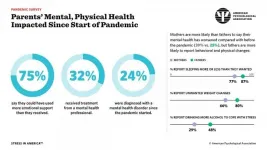(Press-News.org) WASHINGTON -- As growing vaccine demand signals a potential turning point in the global COVID-19 pandemic, the nation's health crisis is far from over. One year after the World Health Organization declared COVID-19 a global pandemic, many adults report undesired changes to their weight, increased drinking and other negative behavior changes that may be related to an inability to cope with prolonged stress, according to the American Psychological Association's latest Stress in America™ poll.
APA's survey of U.S. adults, conducted in late February 2021 by The Harris Poll, shows that a majority of adults (61%) experienced undesired weight changes - weight gain or loss -- since the pandemic started, with 42% reporting they gained more weight than they intended. Of those, they gained an average of 29 pounds (the median amount gained was 15 pounds) and 10% said they gained more than 50 pounds, the poll found. Such changes come with significant health risks, including higher vulnerability to serious illness from the coronavirus. For the 18% of Americans who said they lost more weight than they wanted to, the average amount of weight lost was 26 pounds (the median amount lost was 12 pounds). Adults also reported unwanted changes in sleep and increased alcohol consumption. Two in 3 (67%) said they have been sleeping more or less than desired since the pandemic started. Nearly 1 in 4 adults (23%) reported drinking more alcohol to cope with their stress.
"We've been concerned throughout this pandemic about the level of prolonged stress, exacerbated by the grief, trauma and isolation that Americans are experiencing. This survey reveals a secondary crisis that is likely to have persistent, serious mental and physical health consequences for years to come," said Arthur C. Evans Jr., PhD, APA's chief executive officer. "Health and policy leaders must come together quickly to provide additional behavioral health supports as part of any national recovery plan."
The pandemic has taken a particularly heavy toll on parents of children under 18. While slightly more than 3 in 10 adults (31%) reported their mental health has worsened compared with before the pandemic, nearly half of mothers who still have children home for remote learning (47%) reported their mental health has worsened; 30% of fathers who still have children home said the same. Parents were more likely than those without children to have received treatment from a mental health professional (32% vs. 12%) and to have been diagnosed with a mental health disorder since the coronavirus pandemic began (24% vs. 9%). More than half of fathers (55%) reported gaining more weight than they wanted to, and nearly half (48%) said they have been drinking more alcohol to cope with stress.
The majority of essential workers (54%), such as health care workers and people who work in law enforcement, said they have relied on a lot of unhealthy habits to get them through the pandemic. Nearly 3 in 10 (29%) said their mental health has worsened, while 3 in 4 (75%) said they could have used more emotional support than they received since the pandemic began. Essential workers were more than twice as likely as adults who are not essential workers to have received treatment from a mental health professional (34% vs. 12%) and to have been diagnosed with a mental health disorder since the coronavirus pandemic started (25% vs. 9%).
Further, people of color reported unintended physical changes during the pandemic. Hispanic adults were most likely to report undesired changes to sleep (78% Hispanic vs. 76% Black, 63% white and 61% Asian), physical activity levels (87% Hispanic vs. 84% Black, 81% Asian and 79% white) and weight (71% Hispanic vs. 64% Black, 58% white and 54% Asian) since the pandemic began. Black Americans were most likely to report feelings of concern about the future. More than half said they do not feel comfortable going back to living life like they used to before the pandemic (54% Black vs. 48% Hispanic, 45% Asian and 44% white) and that they feel uneasy about adjusting to in-person interaction once the pandemic ends (57% Black vs. 51% Asian, 50% Hispanic and 47% white).
"It's clear that the pandemic is continuing to have a disproportionate effect on certain groups," said APA President Jennifer Kelly, PhD. "We must do more to support communities of color, essential workers and parents as they continue to cope with the demands of the pandemic and start to show the physical consequences of prolonged stress."
Overall, Americans are hesitant about the future, regardless of vaccination status. Nearly half of adults (49%) said they feel uneasy about adjusting to in-person interaction once the pandemic ends. Adults who received a COVID-19 vaccine were just as likely as those who had not received a vaccine to say this (48% vs. 49%, respectively).
The full report and more graphics are available at http://www.stressinamerica.org.
Methodology
This Stress in America™ survey was conducted online within the United States by The Harris Poll on behalf of the American Psychological Association between Feb. 19 and 24, 2021, among 3,013 adults age 18+ who reside in the U.S. Interviews were conducted in English and Spanish. Data were weighted to reflect their proportions in the population based on the 2020 Current Population Survey (CPS) by the U.S. Census Bureau. Weighting variables included age by gender, race/ethnicity, education, region, household income and time spent online. Hispanic adults were also weighted for acculturation, taking into account respondents' household language as well as their ability to read and speak in English and Spanish. Country of origin (U.S./non-U.S.) was also included for Hispanic and Asian subgroups. Weighting variables for Gen Z adults (ages 18 to 24) included education, age by gender, race/ethnicity, region, household income, and size of household, based on the 2019 CPS. Propensity score weighting was used to adjust for respondents' propensity to be online.
Parents are defined as U.S. adults ages 18+ who have at least one person under the age of 18 living in their household at least 50% of the time for whom they are the parent or guardian.
INFORMATION:
The American Psychological Association, in Washington, D.C., is the largest scientific and professional organization representing psychology in the United States. APA's membership includes nearly 220,000 researchers, educators, clinicians, consultants and students. Through its divisions in 54 subfields of psychology and affiliations with 60 state, territorial and Canadian provincial associations, APA works to advance the creation, communication and application of psychological knowledge to benefit society and improve people's lives.
The U.S. Congress and Biden-Harris administration have a clear opportunity to supercharge global health research and development (R&D) in the wake of a pandemic that has revealed both the sector's chronic neglect and amazing potential, according to a detailed agency-by-agency action plan released today by the nonprofit Global Health Technologies Coalition (GHTC).
"The same core capabilities instrumental to defeating COVID-19 can also defeat diseases that have plagued humanity for generations--such as AIDS, tuberculosis, malaria and Ebola--while targeting emerging pathogens of pandemic potential," said GHTC Director Jamie Bay Nishi. "Developing vaccines in ...
Reforestation could help to combat climate change, but whether and where to plant trees is a complex choice with many conflicting factors. To combat this problem, researchers reporting in the journal One Earth on December 18 have created the Reforestation Hub, an interactive map of reforestation opportunity in the United States. The tool will help foresters, legislators, and natural resource agency staff weigh the options while developing strategies to restore lost forests.
"Often the information we need to make informed decisions about where to deploy reforestation already exists, it's just scattered across a lot of different locations," says author Susan Cook-Patton, a Senior Forest Restoration Scientist at the Nature Conservancy. "Not everybody has the ...
The impact of the COVID-19 pandemic on public health is staggering; more than one hundred million cases and two million deaths worldwide. In response, most countries and local governments have taken substantial measures -- such as travel restrictions and physical distancing -- to keep their citizens safe. Both the pandemic and related protective measures pose challenges for ongoing clinical research studies seeking to treat and prevent the world's greatest public health emergencies including COVID-19, but also Alzheimer's disease and other dementia.
In a new paper from the World-Wide FINGERS network in Alzheimer's ...
DALLAS, March 11, 2021 -- As integral members of stroke treatment teams, nurses coordinate patient assessment and collaborate care among multiple health care professionals to facilitate the best possible outcomes for patients with acute ischemic stroke. Nurses also advocate for patients and their caregivers to ensure they receive appropriate information and education to successfully navigate phases of treatment in the hospital and after discharge. A series of three new Scientific Statements, "Care of the Patient With Acute Ischemic Stroke," from the American Heart Association, published today in Stroke, a journal of the American Stroke Association, a division of the American Heart Association, provide the latest evidence-based guidance ...
Results published today show it is possible to identify Parkinson's based on compounds found on the surface of skin. The findings offer hope that a pioneering new test could be developed to diagnose the degenerative condition through a simple and painless skin swab.
Scientists at The University of Manchester have developed a technique which works by analysing compounds found in sebum - the oily substance that coats and protects the skin - and identifying changes in people with Parkinson's Disease. Sebum is rich in lipid-like molecules and is one of the lesser studied biological fluids in the diagnosis of the ...
An interdisciplinary research team at Lehigh University has unraveled how functional biomaterials rely upon an interfacial protein layer to transmit signals to living cells concerning their adhesion, proliferation and overall development.
According to an article published today in Scientific Reports, the nanoscale features and properties of an underlying substrate do not impact the biological response of cells directly. However, these properties indirectly influence cell behavior through their control over adsorbed proteins.
In the article, "Nanostructure ...
Firefly beetles rank among the world's most charismatic creatures, with luminous courtship displays that have now turned them into a popular attraction for wildlife tourists. In the first comprehensive review of firefly tourism, published in the journal Conservation Science and Practice, an international team of biologists led by a Tufts University researcher, reveal that an estimated 1 million people now travel each year to witness bioluminescent performances starring some two dozen firefly species around the world.
But the authors also point out that while this unique, insect-based tourism ...
An eight-week programme of mindfulness meditation improves quality of life and reduces fear of activity in heart attack patients, according to research presented today at ESC Acute CardioVascular Care 2021, an online scientific congress of the European Society of Cardiology (ESC).1
"A heart attack is a serious life-threatening event and survivors can suffer from low quality of life," said study author Dr. Canan Karadas of Hacettepe University, Ankara, Turkey. "One reason is a fear of movement, called kinesiophobia, which limits daily activity due to concerns of another heart attack."
"Mindfulness refers to the mental state achieved by focusing awareness on the present moment, ...
The research was published on the journal Nature Catalysis on December 14, 2020.
A strong bias towards linear and disc-shaped molecules has long been observed in drug molecules. In contrast, spherical molecules have been utilized on far fewer occasions, due to the lack of efficient access to the latter chemical space. Specifically, efficient strategies to synthesize tetraarylmethanes, a unique family of spherical molecules, have remained scarce.
Chiral tetraarylmethanes (CTAMs), a unique family of spherical molecules which bear four different aryl groups with defined stereochemistry, remain as a mystery due to the lack of efficient asymmetric synthesis. The challenge in asymmetric synthesis of CTAMs lies in not only the high barrier in making ...
Giving at scale by the super-wealthy has done little to redistribute wealth from rich to poor, helping perpetuate social inequalities rather than remedying them, while paying considerable dividends to donors in the form of privilege and influence in society and politics, new research shows.
In the research paper 'Elite philanthropy in the United States and the United Kingdom in the new age of inequalities' researchers at the University of Bath School of Management and Newcastle University Business School also conclude that giving by the super-wealthy has failed significantly to benefit poor countries in the developing ...




